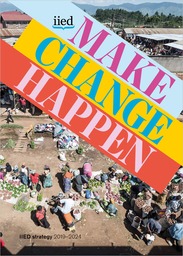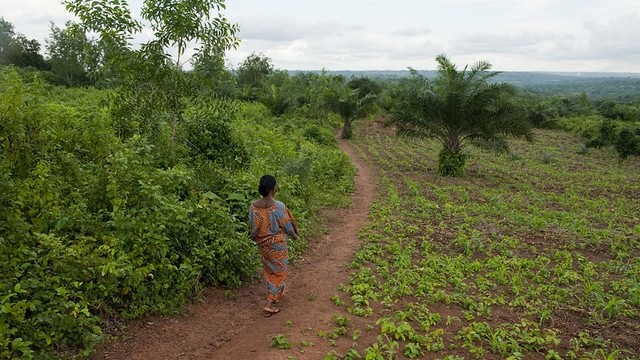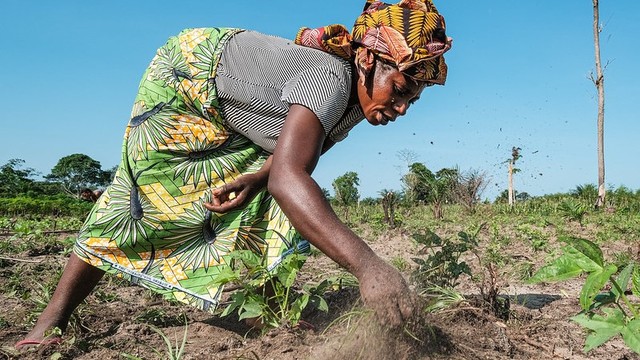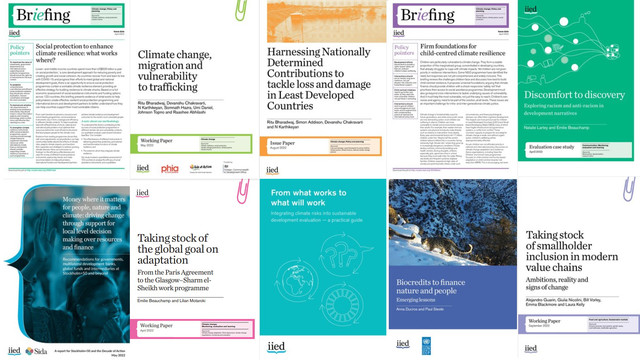IIED's best of 2019: publications
IIED published nearly 200 publications during 2019, ranging from research reports and policy briefings to toolkits and case studies. Here are the top 10 most downloaded.

Top publications of 2019 (IIED)
We have more than 7,000 publications available free of charge in PDF format from our Publications Library, and these were downloaded more than 40,000 times in 2019. Below is a list of our top 10 most-downloaded publications from the last 12 months, with links to related blogs and project pages.
1
Biodiversity loss is a development issue. A rapid review of the evidence
From genes to micro-organisms to top predators and even whole ecosystems, we depend on biodiversity for everything from clean air and water to medicines and secure food supplies. Yet human activities are destroying biodiversity around 1,000 times faster than natural ‘background’ rates.
This global biodiversity crisis is hitting the poorest communities first and hardest, because they cannot afford to ‘buy in’ biodiversity’s previously-free goods and services (and are already bearing the brunt of climate change).
So why does the development community often ignore biodiversity loss? This 24-page issue paper unpicks misunderstandings and sets out the evidence that biodiversity loss is much more than an environmental problem – it is an urgent development challenge.
More about this work: In 2020, the international community will agree a new 10-year strategy for biodiversity management. Ensuring this works for both biodiversity and for people requires more coordinated thinking and action than has happened to date. It is time for the development community to step up to this challenge and engage in the debate. Find out more in the briefing 'Biodiversity loss, development crisis?' and blog 'Development organisations beware! Biodiversity loss is not just an environmental issue', where Dilys Roe explains why development organisations can no longer remain absent from debates on how to tackle dangerous declines in biodiversity.
2
Is ecosystem-based adaptation effective? Perceptions and lessons learned from 13 project sites
The global climate is changing rapidly and countries need clear direction on how best to adapt to these changes. Ecosystem-based adaptation (EbA) is becoming an increasingly popular strategy, especially in poor countries where dependence on natural resources for lives and livelihoods is high. But EbA implementation is neither widespread nor consistent, partly due to a shortage of documented evidence relating to its effectiveness.
This 106-page research report shares results from assessing EbA effectiveness at 13 case study sites in 12 countries to help address this gap. It also describes political, institutional and governance-related conditions that facilitate or inhibit effective EbA at each site.
More about this work: EbA involves people using biodiversity and ecosystem services to adapt to the adverse effects of climate change and promote sustainable development. IIED, the International Union for the Conservation of nature (IUCN) and the UN Environment World Conservation Monitoring Centre (UNEP-WCMC) are implementing a project called 'Ecosystem-based approaches to climate change adaptation: strengthening the evidence and informing policy' to gather practical evidence and develop policy guidance on how EbA can best be implemented. For a case study direct from Chile, the host country of the recent UN climate negotiations, read 'Nature-based solutions to climate change: stories from Chile'
3
Rural producer agency and agricultural value chains: What role for socio-legal empowerment?
Private-sector investment in commercial agriculture in low- and middle-income countries has been growing. And increasing numbers of policies and programmes aim to integrate small-scale rural producers into agricultural value chains, based on ‘inclusive business’ and ‘shared value’.
But significant questions remain over how best to: recognise the conflicting interests of various actors; substantial power imbalances that affect value chain relations; and ultimately support genuine agency among rural producers and their communities.
This 52-page research report explores whether socio-legal empowerment – the combination of recourse to law with related change strategies such as collective action and gaining greater business savvy – might help address these issues. The report develops a conceptual framework to further understand, test and strengthen the contribution of socio-legal empowerment to enhancing the agency of rural actors as they engage with, or are affected by, commercial agriculture.
More about this work: The Empowering Producers in Commercial Agriculture (EPIC) project aims to empower rural producers and their wider communities to influence public decisions and private sector conduct in favour of bottom-up, locally beneficial and more sustainable investments in commercial agriculture.
4
Money where it matters: designing funds for the frontier
With only US$1 in every $10 committed from climate funds for local level climate action, climate finance is failing to get money where it matters. We need to reimagine the climate finance system.
This 40-page issue paper investigates the flow of finance from primary donor to local actor and presents a new framework to get more finance to local institutions to tackle the drivers of poverty, resource degradation and climate change. It also sets out the ways in which primary donors, global funds and financial intermediaries can help make this reimagined climate finance system a reality.
More about this work: Find out more about the project, Breaking down barriers to tenure-positive climate finance where we’re exploring solutions to remove the barriers that stop climate finance reaching the people most vulnerable to climate change. The focus is on the value, blocks and solutions to community funds supporting climate action to clarify community rights to resources. The project strengthens collaboration with these funds and between donors, financial intermediaries, fund aggregators and high- and low-tech innovators.
5
Make Change Happen: IIED strategy 2019-2024
IIED's strategy for the period 2019-2024 sets out how we will work to create positive change, and how we will fight for a fairer future for all.
The strategy describes our institutional theory of change and the four pathways to impact that will help to guide our work and make change happen.
It identifies five global challenges that will be our focus: increasing inequality, the climate crisis, the assault on the natural world, increasing urban risk, and unsustainable markets. It outlines IIED's work programmes and priorities for action in each of these areas.
This 24-page publication includes examples of how we're working in partnership with others to generate innovation at scale, researching local knowledge to inform global thinking. It also highlights our focus on effective monitoring, evaluation and learning across our work.
More about this work: Watch the video of IIED director Andrew Norton where he shows how IIED's research takes valuable local solutions to influential global forums, achieving impact at many levels. In a fractured world our network of partners brings together the missing voices and evidence that policymakers need to make the right decisions for people and planet.
6
Equity-focused, gender-responsive evidence: a blind spot in VNR reporting
At the 2018 High-level Political Forum (HLPF), 46 countries expressed their commitment to the 2030 Agenda for Sustainable Development by voluntarily presenting national reviews of their progress on implementing the Sustainable Development Goals (SDGs). Analysis of these voluntary national reviews (VNRs) found that, although monitoring is strong, evaluation receives almost no attention. VNR reporting is not incorporating evaluative evidence, particularly equity-focused and gender-responsive evidence. Access to disaggregated data is a core challenge to tracking progress. Nevertheless, countries are actively looking for solutions, recognising that gender equality is an enabler and accelerator in achieving all the SDGs.
This briefing shows that equity-focused, gender responsive implementation, assessment and evaluation of the 2030 Agenda offers an opportunity for transformative change to achieve gender equality and equity in the SDGs era and beyond.
More about this work: Evaluation processes play a key role in national and global review systems for the Sustainable Development Goals. IIED and EVALSDGs have published a series of briefings about evaluation designed to help promote effective conduct and use of evaluation in SDGs implementation, follow-up and review.
7
Evaluating sustainable development: how the 2030 Agenda can help
As countries increasingly commit to sustainable development pathways, they need approaches that assess the sustainability dimension of national policies and interventions, including their contribution to multiple sustainable development aims. Previous briefings have discussed the importance of evaluation in 2030 Agenda national follow-up and review processes.
This briefing looks at how the 2030 Agenda and its goals can provide a sustainable development framing for a broader range of national evaluation efforts: assessing how well national policies, programmes and projects fit with one another and across the SDGs; the value of the goals in stimulating policy-oriented learning from evaluation; and how aspects of the agenda can be integrated into evaluation criteria and questions.
More about this work: We work with partners to generate the right type of evidence, at the right time, for the right people. We try to use the most appropriate qualitative and quantitative methods to assess the effectiveness and equity of interventions at local, national and global level – including the SDGs.
8
Future scenarios and projections for fisheries on the high seas under a changing climate
Marine biodiversity and ecosystems provide important benefits to human societies through fisheries. But the benefits are not shared equally among countries – and climate change will only exacerbate inequalities. Improving high seas fisheries governance would help redistribute benefits and reduce climate risks, especially in developing countries where many people depend on fish for their food and nutrition security, livelihoods and wellbeing. Developing countries are also among the most vulnerable to climate change impacts.
This 44-page working paper explores different scenarios of future fisheries governance and evaluates the benefits and trade-offs of alternative policy frameworks for governing fisheries under a changing climate.
More about this work: IIED is working with the least developed countries (LDCs) to increase their engagement and effectiveness in the international treaty on the high seas. The technology that enables the exploitation of the high seas is the preserve of advanced nations: vessels from ten rich nations, including Japan, Korea, and Spain, take 71% of fishing catches from the high seas.
IIED is providing legal, technical and strategic advice to equip LDC negotiators with the information they need to take forward positions and support strong marine conservation measures. We produced a series of three animations on how nations can move towards an inclusive blue economy.
9
Projet de réforme minière au Mali : trois secteurs clés à améliorer
Mining is critical to Mali’s economy and post-conflict rebuilding, yet the sector faces huge challenges that impact both the environment and the economy. To address these issues, in 2014 the government announced plans to reform its 2012 mining code, though progress has been slow. This policy briefing sets out key technical recommendations for the ongoing reform programme that would enable Mali to overcome obstacles to derive greater revenue from mining, to improve local development around mining sites and to strengthen the rights of artisanal gold miners.
This briefing, produced under IIED’s Legal tools for citizen empowerment project, was published in French and English. The French translation had over 800 downloads in 2019, the majority coming from the global South.
More about this work: In the recent blog, 'Mali’s new mining law: an improvement, but fails artisanal miners', IIED’s Brendan Schwartz and extractive and energy consultant Ahamadou Mohamed Maiga assessed the significance of three aspects of Mali’s long-awaited mining reforms (ce blog est également disponible en français).
10
Climate crisis planning: a toolkit for building local urban resilience
Thailand’s cities are highly vulnerable to the impacts of climate change and are already struggling to deal with these impacts. Making urban areas like Bangkok as safe and resilient as possible must be a policy priority for local and national governments. But to be effective, planning for urban resilience must be inclusive and involve local communities to prepare to deal with potential crises such as flooding, drought or an economic crisis.
This briefing describes how a new interactive toolkit has been developed and tested in urban communities in Bangkok to help develop strategies for managing climate crises.
More about this work: This research is part of the 'Planning for Eco-Cities and Climate-Resilient Environments: Building Capacity for Inclusive Planning in the Bangkok Metropolitan Region (PEACE-BMR)' collaboration between IIED and the Faculty of Architecture and Planning at Thammasat University. The IIED-APTU partnership intends to strengthen the understanding of community organisations of the risks of climate change and actions that can be taken to reduce impacts.
Our Publications Library is a repository, storing over two decades of outputs.
Search over 7,000 individual records
Previous years
Click on the year to see IIED's most downloaded publications for the last six years: 2018; 2017; 2016; 2015; 2014; 2013













